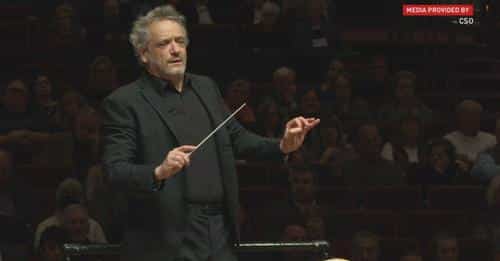How much is your maestro worth? More than a whole orchestra
NewsPeter from San Diego has supplied us with some fascinating statistics, based on Drew McManus’s charts of orchestral pay.
Knowing that Riccardo Muti is paid $3.5 million in Chicago, he has worked out that this exceeds the entire budget of the following professional symphony orchestras:
Symphony Silicon Valley ($3.24 million)
Allentown Symphony
Oakland Symphony
Harrisburg Symphony
Albany Symphony
West Virginia Symphony
Orchestra Iowa
Chattanooga Symphony ($2.58 million)… and more.
Even more interesting, Muti’s pay constitutes 4.35% of the Chicago Symphony’s turnover, the biggest of any major orch. The most frugal with maestro pay, measured by turnover, are the following:
Indianapolis Sym $32,118,817 $566,028 1.76%
Los Angeles Phil $166,254,625 $2,857,103 1.72%
Cincinnati Sym $33,288,825 $555,813 1.67%
Boston Sym $109,772,097 $1,787,000 1.63%
Sarasota Orch $10,877,073 $169,062 1.55%
Colorado Sym $14,407,985 $219,723 1.53%
Houston Sym $33,147,136 $459,132 1.39%
North Carolina Sym $16,315,140 $221,000 1.35%
New York Phil $79,928,470 $816,375 1.02%
Atlanta Sym $107,113,113 $708,326 0.66%






Beckmesserei
These sorts of comparison are fun facts, but ultimately not very useful, because arts funding is not fungible, it isn’t the case that if Sam Zell gave less money to Riccardo Muti that Sam Zell would give a single penny to the Chattanooga Symphony.
The arts in America depends entirely on the largess of a few quirky benefactors, and they do what they want to do.
Sure, the guy who paid $28 million for a ticket to ride into space with Jeff Bezos for 11 minutes…I mean, yeah, he could’ve financed 14 orchestras for one year. But that’s not how things work. It’s just another fun fact.
I wouldn’t be quite so dismissive. When conductors command massive salaries like this, it raises the stakes. Other baton-wavers tell their agents they should be getting similar fees for their work. And it then becomes that much harder for orchestras like the West Virginia or Harrisburg Symphony to recruit the best talent.
That presumes that the size of the fee is indicative of “the best talent”. I argue that it is not and far from it.
So true…
I’ve got news for you, Brian – the best talent isn’t going to West Virginia regardless of what it pays.
Thanks for writing that Josh – beat me to it.
How many of the best talents want to conduct either of those 2 orchs.?
Consider this comparison:
1) Zell is worth $5.5 Billion.
2) He gives $3.5 million to Muti.
3) Which is but 0.0006363 of Zell’s net worth.
4) Which is the equivalent of someone making $100,000 a year giving Muti $63.63 a year!
Muti’s salary is just pocket change for billionaires.
Pocket change!
Zell’s pay to Muti is not reinvested in America, but in Italy, in Muti’s Cherubini youth orchestra and in his Ravenna festival.
Zell’s investment in Muti does not have a multiplier effect in the arts in America.
Yet another reason why the CSO should hire an American music director.
It’s not quite as simple: The money that is “donated” to arts is exempt from taxes, and without these tax cuts, none of these “philantropes” would make these kind of donations. Thus a big chunk of the money “donated” to orchestras by individuals is actually tax payers money. I would argue that the contribution of the tax payer made to fund the arts is larger in the US than in Europe. The only difference is that in the US these tax payers have no say in how the money is spent.
In summary: the Cherubini scheme is financed by German taxpayers (COVID funds which ultimately come from German pockets) and US taxpayers (through billionaire’s tax-exempt donations).
Not a penny goes to the cherubini artists, but they produce records for Muti’s label
nice job Muti!
Muti gets paid pittance compared to NFL, NBA, or major league players. And he has a longer career than every single major league overpaid athlete. Muti deserves every penny.
The shorter career is why the overpaid athletes are overpaid. They won’t be able to do much else when it’s over.
Not my pennies.
(btw the comparison makes no sense. NFL teams are global brands watched and followed by hundreds of millions worldwide. Classical music as an industry is a niche form of entertainment – I use this word on purpose, because it is that – it is not comparable to mass sports, at all. Unless it learns from mass sports, like Mr. Lebrecht has suggested)
Apples, meet oranges.
Hahaha
CRWang please share what you are smoking
Hahahaha
Overpaid athlete? There is no such thing.
Professional athletes are the best in the world at what they do. They have rare skills that are not easily replaced. And their skills attract viewers – live and on television – which generates a lot of revenue, of which they get a share.
Athletes get paid what they do because they demand it and can get it, and because their work generates the revenue. They would be fools to ask for less. Muti gets what he does because he can – and the CSO apparently believes someone else would pay him that if they didn’t.
Riccardo Muti is smart and he understood a long time ago that American is the Land of Opportunity.
His comments are often misinterpreted. For example, he told the Financial Times: “When I made tours around the US, I was shocked to find reviews written on a page called ‘entertainment’: topless show next to Bruckner Seven. That says it all. ”
US readers were offended for a comment read as disparaging. Instead, Muti meant to praise America, the place where he knew he could have it all!
But maybe his artistic development stopped decades ago…..
I remember the Maestro Riccardo Muti giving a sermon in the Vienna Philarmonic for New Year’s Day and preaching that music is a mission.
It is a well paid mission , can I sign up?
Asking How do I get to Carnegie Hall: Practice, my boy, Practice! If you had the talent & endurance (it takes both) in 40 years you might be able to earn that salary.
Why not, providing you can read and study a 12-stave score and put your ideas over to what Solti once called “a hundred hostile musicians”?
You shouldn’t treat these numbers reported in 990s as gospel.
As other posters have noted, conductors can receive additional compensation outside of their salary which is not reported, such as being paid as a contractor for part of their duties, free housing, an extremely generous travel allownace, etc.
There are a lot of reasons why orchestras and conductors want to hide what the conductor’s true pay is — such as to avoid this kind of press attention and to minimize the extent to which labor unions can use it as a data point to ask for higher wages.
Given how much of an outlier Muti is among his peers, and that they’re all aware of how much each other are paid so they can use that when negotiating their own contracts, it seems likely that the MTT, Nelsons, YNS, and FWM all have some significant, additional income not listed in the 990. And would anyone be surprised if Salonen is getting paid as much as Muti?
Frankly Muti isn’t worth that money, especially for symphonic repertoire. Nobody in Europe would pay that much for him!!
Nobody in Europe has that much to pay him.
And yet, somehow, the European orchestras have conductors and music directors as well. And pretty good ones.
I live in a town with 100.000 people. It has a full professional orchestra, paid for by municipal funds. (The next opera house is 30 minutes away.) Granted, it is not the Berlin Phil or the CSO, but they are still professionals who know what they are doing. And so does the music director, even though he is payed only a mere fraction of Muti’s salary.
But then, his salary does not depend on the commendable largesse of one very rich individual, but on the will of the community and its democratically elected officials. The German system of financing orchestras and opera houses strikes me as a bit more reliable than the American one…
Do we know the VPO figures?
He is much valued by the Vienna Philharmonic, for a start.
Albany Symphony NY or Albany Symphony GA?
NY
What a useless comparison. I’ll give you another:
BREAKING NEWS
Chase Bank CEO’s salary equal to the entire holdings of some random, rural bank with a single location.
I cannot roll my eyes hard enough.
Peter from San Diego must still be in a Covid lock-down with lots of time on his hands . . . . #uselessinformation
The Atlanta Symphony budget is not $107,113,113.
The Orchestra is part of the The Woodruff Arts Center, that includes a museum and playhouse — $107 million is its budget. The 990 does not delineate what what are specific ASO expenses.
To clarify: I was not intending to make value judgements. The first table was in response to Frau Geigerin’s comment that Muti’s salary might pay for “a chamber orchestra in a European village.” I decided to see if that was true, and to my slight surprise, I found that it could pay for a full orchestra in some sizable US cities. I’m neither approving nor disapproving of his salary, and I’m certainly NOT criticizing the Zell family’s generosity.
Comparing music directors’ salaries (not their full annual compensation, since it doesn’t include guest conducting fees, etc.) to an orchestra’s annual budget is a means to assess how a given orchestra association chooses to allocate its budget. Nothing more, or less. The span of the percentage, from a low of 0.66% (Atlanta) to a high of 7.56% (Harrisburg), surprised me, but it’s no cause, in itself, to second-guess any of the organizations.
Whether a given conductor is worth their salt is a matter of opinion, and the readership of SD seems unable to achieve unanimity on any conductor I’ve ever seen mentioned here.
As I keep saying, and will keep saying because it’s so frustrating, these numbers should be taken with a grain of salt because they only give you hints of what an actual orchestra’s expenditures are, what people are paid, etc.
Using these numbers to make comparisons is highly problematic because orchestras have different types of expenses. As I noted before, LA operates its venues and has staffing a facility expenses that NYP doesn’t have because Lincoln Center owns and operates NYP’s concert hall. Thus, on paper, it looks like it costs nearly 2x to run LA than NYP, but a lot of those costs have nothing to do with the orchestra.
Then you have orchestras like the ASO which are part of a larger arts organization, The Woodruff Arts Center ($107 million is the cost of its budget, not the ASO).
And as I and others have mentioned before, conductors have additional compensation that doesn’t show up in a 990.
Finally, if you really want to try and analyze whether or not some deserves their multi-million dollar salary, you would need to factor in year over year fundraising and audience retention.
Considering the number of times most orchestras play the same pieces, do they even need a full time conductor?
Yes.
Right, Peter – innocent. You didn’t mean to stir the pot at all, did you? Please. Did you do any work to compare how many weeks each conductor is on the podium? Whether (s)he listens to auditions? Is paid extra or not for media projects? If the podium is specifically endowed by a wealthy donor? If there’s separate compensation for touring? You did none of these because your knowledge of the business is superficial and you take joy in getting things riled up and then moving on. You’re a waste of time.
Why don’t you do this research, if you think it is important. And when you have done it, why don’t you share the figures with the rest of us.
A full time conductor can do a deal of good – if he’s up to the job.
Of course Muti worth every cent. Chicago is the best and all others can stuff it.
The best at what?
The best orchestra and the one most likely to present a monumental performance.